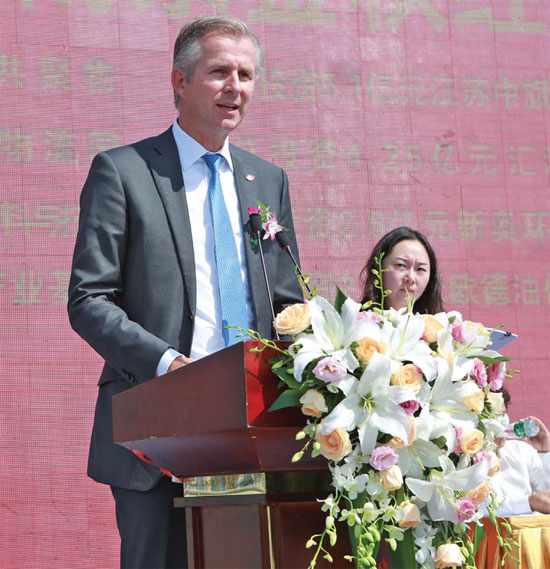Heraeus mines precious market
German company breaks ground on record $100m Nanjing metals recycling plant
German technology company Heraeus has broken ground on a factory in eastern China, its largest investment in the country, as it aims to grow its market share to 20 percent by 2020.
Work officially began on its $100 million precious metal plant on Sept 20 in Nanjing, Jiangsu province.
|
Jan Rinnert at the ground-breaking ceremony of Heraeus Nanjing's factory on Sept 20. Provided to China Daily |
Once complete, the facility is expected to significantly boost the company's capacity to recycle precious metals, especially platinum group metals, says Jan Rinnert, chairman of Heraeus' board of management.
"Heraeus have been active in China's precious metal market for many years, with activities in trading, recycling and in precious metal production," Rinnert says. "We already offer the full loop of the precious metal business, and it's even more relevant in the future under the circular economy."
China has limited natural platinum group metals and relies on imports and recycling. In 2015, the nation's platinum demand (66 metric tons) was about 25 times higher the domestic supply (2.6 tons). The annual global supply is 190 tons.
With such a large gap between supply and demand, Rinnert says recycling of precious metals can make significant contribution to securing future supplies of platinum and other precious metals, such as silver and gold.
He says Heraeus aims to have the Nanjing plant complete by 2018 and a 20 percent share of the Chinese market by 2020.
All the products from the plant will go to supplying China, he says. "It's our philosophy that when we do it here, we do it for the China market. We never look at China as a low-cost production country."
The German company will use recycled precious metals to produce homogenous and platinum group metals-based catalysts for pharmaceutical, fine chemical and chemical processes or emission catalysts to be applied in the automotive, silicon or pharmaceutical industries.
In contrast to the low performance of China's metals and nonferrous metals markets, the precious metals sector has remained upbeat thanks to the government's strategy of buying in bulk, Nikkei Asia Review reported.
Shanghai Securities News also reported that regulatory measures are in the pipeline to ensure the healthy development of the market.
As part of its customer focus, Rinnert says Heraeus will enhance its precious metals management portfolio in China, such as its physical supply of precious metals, pool accounts and transfers, and precious metals risk management and financing. The company is the only one in China authorized to offer precious metals leasing for industrial purposes.
"Precious metals are a rare resource, and as one of the world's largest precious metals companies, Heraeus is uniquely qualified to provide the most advanced precious metal recycling and processing in China," he says.
"Our advanced technologies will support China's 13th Five-Year Plan (2016-20) in all aspects - in innovation, green development and socially - and more than 200 highly skilled experts will be working at the Nanjing site by 2020."
Ai Zhouping, president of Heraeus Greater China, says the factory will cover 84,000 square meters in the Nanjing Chemical Industry Park, which was selected from 60 potential locations nationwide.
The factory and office buildings have been designed to apply and even exceed China's state and provincial environment health safety standards, codes and regulations.
"We're well positioned in light of the 13th Five-Year Plan, which requires new trends, sophisticated products, more domestic demand, circular economy, protection of environment, resources and energy," Rinnert says.
China, the world's second-largest economy, is determined to pursue a more sustainable development strategy, as outlined in the five-year plan. One of the five key concepts, green development, places importance on developing the green economy by tackling pollution and energy efficiency issues with market initiatives.
With this in mind, Heraeus is aiming to be a role model for companies looking to support China's sustainable strategy.
The family-owned company was founded in 1851 and is headquartered in Hanau, a town 25 kilometers east of Frankfurt. Its portfolio ranges from components to coordinated material systems used in a wide variety of industries, including steel, electronics, chemical, automotive and telecommunications.
Heraeus has been active in China for more than 40 years, and the country is now the company's largest single market, accounting for up to 30 percent of its revenue.
wang_ying@chinadaily.com.cn



















